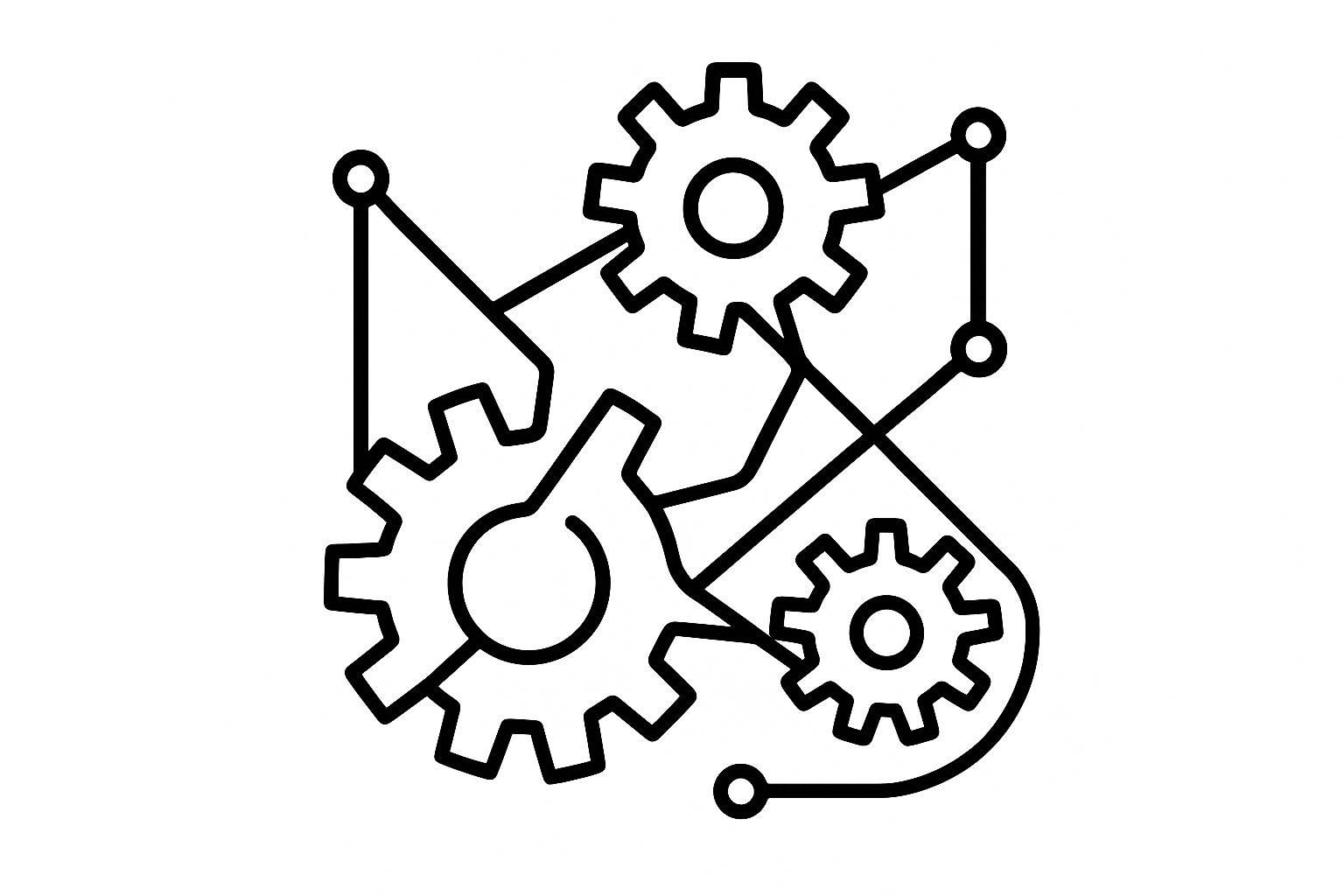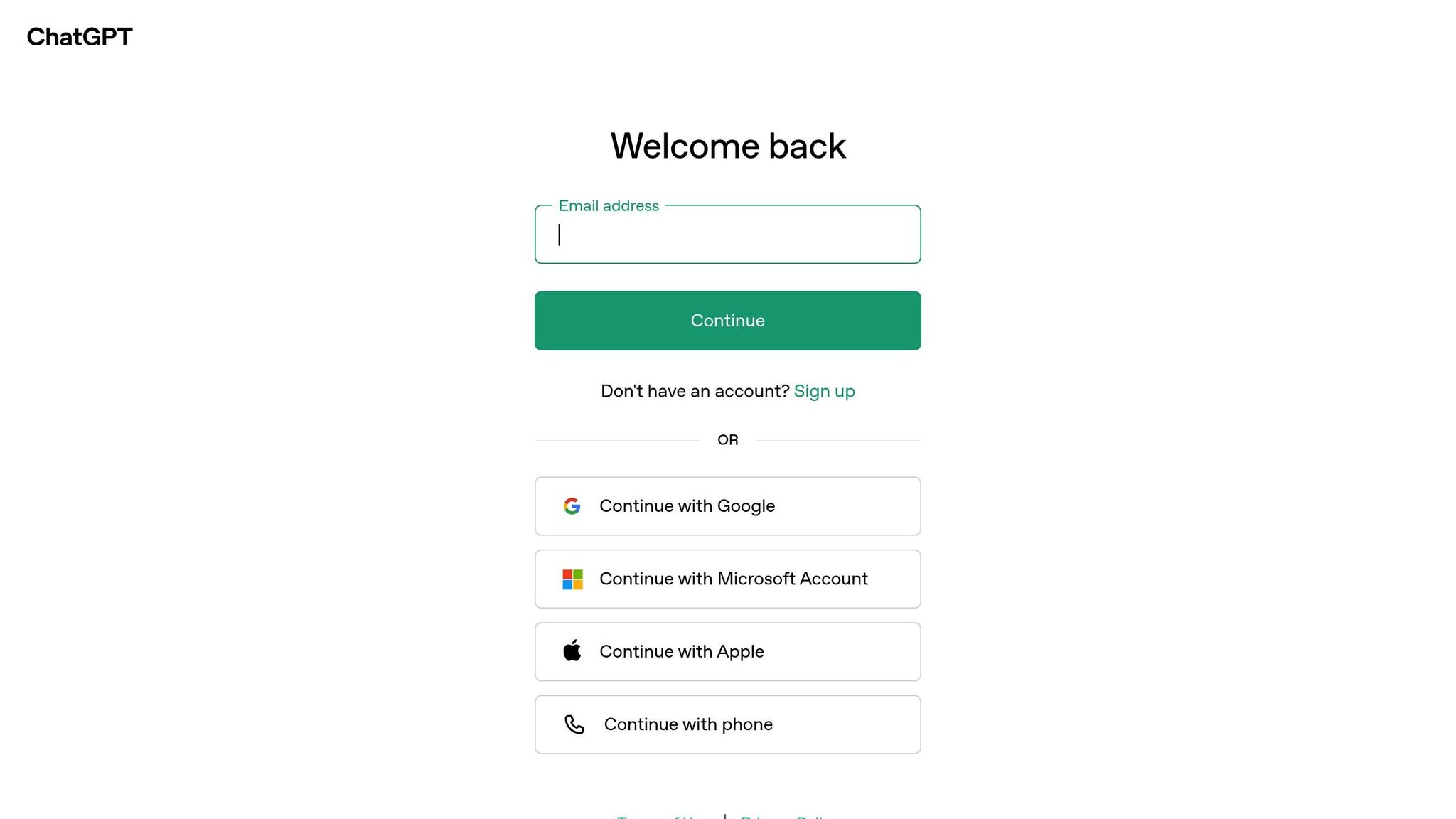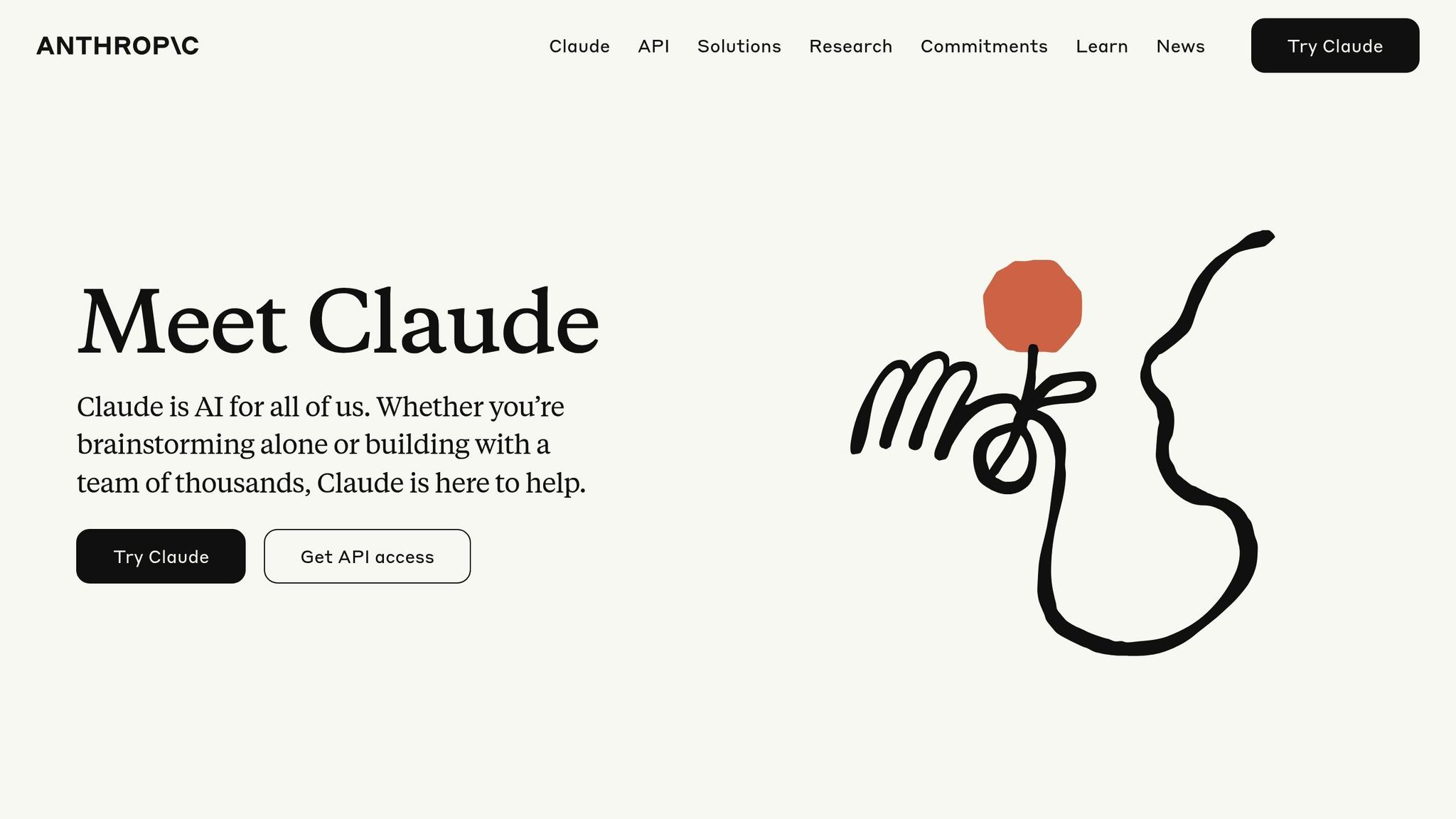
AI agents are reshaping how businesses operate in 2025, offering advanced automation and smarter decision-making. Here's what you need to know:
AI agents are not just tools - they're changing how work gets done. By learning and acting independently, they offer businesses a way to save time, cut costs, and improve outcomes. Ready to learn more? Let’s dive in.
AI agents play a crucial role in automating tasks and enabling smarter decision-making. These core functions have transformed business operations, making them more efficient and effective.
AI agents are designed to carry out tasks on their own, significantly improving productivity. Take, for example, a global bank that implemented AI virtual agents for customer service. The result? A staggering 10x reduction in operational costs.
Here’s how these self-running capabilities are applied in various fields:
| Task Type | Automation Capability | Business Impact |
|---|---|---|
| Content Creation | Blog post generation and optimization | 95% cost savings, 50x faster publishing |
| Clinical Documentation | Report drafting and analysis | 35% increase in time efficiency |
| Legacy System Modernization | Technology updates and maintenance | Up to 40% boost in productivity |
| Customer Service | Automated responses and inquiries | 10x cost reduction |
"Think of agents as the new apps for an AI-powered world. We're rapidly adding new capabilities to tackle individuals' biggest pain points at work and drive real business results." - Jared Spataro, Microsoft's chief marketing officer for AI at Work
In addition to performing tasks autonomously, AI agents shine when it comes to analyzing data patterns.
AI agents excel at processing massive datasets to uncover trends and detect irregularities. For instance, Unilever utilized AI agents to enhance demand forecasting and streamline supply chain operations. By analyzing real-time sales data alongside external factors, they optimized stock levels and minimized inventory waste.
Key pattern recognition capabilities include:
AI agents are built to integrate seamlessly across diverse platforms. This ability has driven the global AI agents market, which is expected to grow from $5.40 billion in 2024 to $7.60 billion in 2025.
| Integration Type | Function | Business Application |
|---|---|---|
| Data Processing | Automated data entry and validation | Streamlined workflows |
| System Communication | Cross-platform coordination | Improved operational efficiency |
| Workflow Automation | Task orchestration across systems | Reduced manual intervention |
| Real-Time Analytics | Continuous performance monitoring | Smarter decision-making |
"AI agents are not only a way to get more value for people but are going to be a paradigm shift in terms of how work gets done." - Ece Kamar, Managing Director of Microsoft's AI Frontiers Lab
These integrations allow businesses to build automation networks where multiple AI agents collaborate on complex processes. For example, in e-commerce, different AI agents can simultaneously manage inventory, respond to customer inquiries, and handle order fulfillment.
The world of AI agents has seen remarkable advancements, with several platforms setting new benchmarks in business automation and productivity. Let’s take a closer look at the standout capabilities of today’s leading AI agents.

ChatGPT stands out for its ability to generate content and foster customer engagement. Recent updates have improved its factual accuracy and ability to handle context-aware conversations. Businesses use ChatGPT for a variety of purposes, including crafting marketing materials, delivering 24/7 customer support, and assisting with business analysis. These features highlight its versatility in meeting a wide range of business requirements.

Claude 4 takes on complex business tasks with two tailored versions:
| Feature | Opus 4 | Sonnet 4 |
|---|---|---|
| Token Processing | $15/$75 per million tokens | $3/$15 per million tokens |
| Primary Use Case | Complex reasoning and coding | General business tasks |
| Integration | IDE compatibility | Third-party apps integration |
Anthropic, the company behind Claude, is projected to see earnings grow from $2.2 billion in 2025 to $12 billion by 2027. Claude 4’s quick response times and detailed analytical capabilities make it particularly appealing to data-heavy industries, offering tools that simplify intricate workflows and drive operational efficiency.
Adding to the strengths of ChatGPT and Claude, Copilot enhances workplace efficiency by seamlessly integrating with business applications.
British Columbia Investment Management Corporation
Lumen
"With Copilot, our IT team saves between 10% and 50% of time." – Daniel Ivanov, Director of Corporate IT, Paysafe
Priced at $30 per user per month, Copilot integrates with Microsoft 365, offering a streamlined approach to workflow automation.
AI agents are transforming how businesses operate by taking on tasks and analyzing data across various departments. Let's explore how they're making a difference in marketing, customer service, and process efficiency.
AI is reshaping marketing strategies, with 71% of marketers planning to adopt generative and predictive AI within the next 18 months. These tools are making content creation faster and more effective by:
AI-powered customer service is driving measurable improvements across industries, with over 60% of businesses incorporating generative AI into their operations. Here are some standout examples:
AI agents are also enhancing operational workflows. Gartner predicts that by 2028, 33% of enterprise software applications will integrate agentic AI, a sharp rise from less than 1% in 2024.
Here are some real-world examples of AI-driven efficiency:
For businesses looking to harness AI effectively, success often depends on a few key steps:
When choosing AI tools, it's essential to focus on solutions that can genuinely improve efficiency in your business operations. Keep these key criteria in mind:
| Selection Criteria | Considerations |
|---|---|
| Task Specificity | Tools designed for specific tasks or use cases |
| Integration | How well the tool works with your existing systems |
| Security | Ensures data privacy and meets compliance standards |
| Scalability | Capable of growing with your business needs |
| Support | Availability of technical help and training resources |
Start with narrow, clearly defined use cases. For example, McKinsey and Company's use of Copilot Studio shows how targeted deployment can yield impressive results - cutting lead times by 90% and reducing administrative tasks by 30%. With these criteria in mind, you can confidently move forward with integrating AI agents into your workflow.
Once you've selected the right tools, follow a structured plan to integrate them effectively into your processes:
"AI agents mark a 'second act' in automation - one that blends precision with intelligence." – Daniel Dines, CEO of UiPath
To make your AI agent setup even more effective, explore specialized tools designed to simplify deployment and ensure ongoing optimization. These resources offer:
By 2025, AI agents are playing a pivotal role in accelerating automation across industries. Recent data shows that 99% of enterprise developers are now integrating AI agents into their workflows.
Here’s a snapshot of key advancements shaping this landscape:
| Development Area | Current Impact | Business Implications |
|---|---|---|
| Agent Orchestration | Collaboration among AI agents | Streamlined workflow automation |
| Data Integration | Unified data platforms | Enhanced data analysis capabilities |
| Security Features | Pre-built secure agents | Reduced implementation risks |
| Custom Building Blocks | Modular AI components | Faster and more flexible deployment |
One standout example comes from Stanford Health Care, which uses Microsoft's healthcare agent orchestrator to cut down administrative tasks in tumor board preparation. These innovations are paving the way for businesses to implement AI strategically, adapt their workforces, and manage risks effectively.
"Last year was the year of experimentation and exploration for enterprises. They need to scale that impact and maximize their ROI of generative AI. Agents are the ticket to making that happen."
- Maryam Ashoori, PhD, Director of Product Management, IBM® watsonx.ai™
McKinsey research highlights a $4.4 trillion potential in productivity growth from AI-driven corporate initiatives. Yet, only 1% of leaders feel their companies have reached maturity in AI deployment.
Here’s how businesses are finding success with AI:
"Think of agents as the apps of the AI era. Just as we use different apps for various tasks, agents will begin to transform every business process, revolutionizing the way we work and manage our organizations."
- Charles Lamanna, Corporate Vice President of Business and Industry Copilot
Looking ahead, the future of AI agents is bright. With 92% of companies planning to increase their AI investments over the next three years, the focus will be on adopting AI responsibly. The goal? To ensure AI supports and enhances human capabilities rather than replacing them.
AI agents are driving transformative success as we approach 2025, with the global market anticipated to hit $47.1 billion by 2030. These advanced systems are unlocking unparalleled efficiency across industries.
Early implementations have already delivered impressive results, such as boosting operational efficiency by up to 50% and slashing content creation costs by a staggering 95%. Their influence spans multiple domains, reshaping workflows in marketing, customer service, R&D, and IT operations. Here's a closer look at their impact:
| Business Area | Key Benefits | Impact Metrics |
|---|---|---|
| Marketing | Campaign optimization | 6x faster, 83% cost savings |
| Customer Service | Virtual agent deployment | 10x cost reduction |
| R&D | Clinical study reporting | 25% faster, 35% efficiency |
| IT Operations | Legacy modernization | 40% productivity increase |
Michelle Grant, Director of Retail Strategy and Insights at Salesforce, captures the transformative potential of AI agents:
"AI agents represent the next wave of retail AI innovation - digital labor that promises to reshape how retailers scale their workforces, serve and market to customers, and streamline operations."
To make the most of AI agents, businesses should focus on these key strategies:
These steps pave the way for a strong AI-driven future. With 92% of companies planning to increase their AI investments in the next three years, the momentum is undeniable. Sundar Pichai, CEO of Alphabet, underscores this sentiment:
"AI is one of the most profound technologies ever developed."
To integrate AI agents responsibly while staying efficient and managing costs, businesses need to establish clear ethical principles and ensure accountability. This means setting up policies that promote fairness, transparency, and the minimization of bias in AI systems. Conducting regular audits is also essential to track compliance and tackle ethical issues before they escalate.
It's equally important to keep humans in charge of critical decisions and involve a diverse group of stakeholders in conversations about how AI is used. By putting ethics at the forefront, companies can strengthen trust, mitigate risks, and achieve sustainable efficiency and cost management - all while adhering to responsible AI practices.
To bring AI agents into your workflows effectively, start by setting clear, specific goals that tie directly to your business needs. Pinpoint areas where AI can make a real difference - like automating repetitive tasks or enhancing customer support.
Then, take a close look at your current workflows to identify processes that could gain the most from AI. Focus on areas where automation can save time or improve accuracy, but also leave room for adjustments as your needs evolve.
Lastly, put monitoring and feedback systems in place to keep an eye on how well the AI agents are performing. Regularly review their impact and make tweaks as needed. By following a thoughtful, step-by-step plan, you can successfully integrate AI into your operations and see meaningful improvements in both productivity and efficiency.
AI agents bring a fresh approach compared to traditional automation tools, thanks to their ability to learn, adjust, and make decisions on the fly. Unlike tools that rely on rigid rules to manage repetitive tasks, AI agents use machine learning to handle more intricate and unpredictable scenarios. This flexibility makes them highly effective in ever-changing environments.
Here’s why AI agents are game-changers:
With AI agents in the mix, businesses can simplify operations, elevate productivity, and cut costs - making them a powerful asset for today’s fast-paced workflows.





